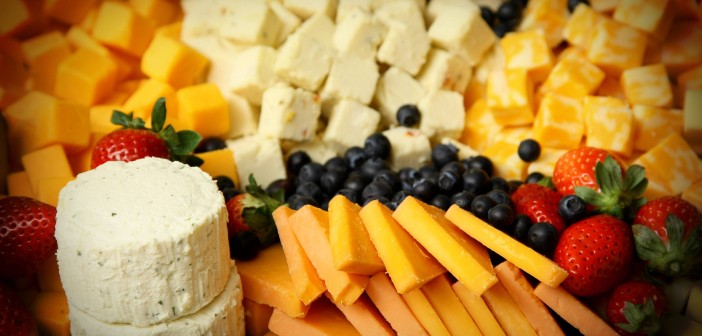What would a juicy hamburger be without a slice of American cheese? What about broccoli without melted cheddar or nachos without creamy cheese sauce? None of these treats would be the same. And yet, some of us have been saying “no” to cheese due to concerns about fat and cholesterol. Increasingly, however, nutritionists are concluding that there is no scientific reason to “hold the cheese.” The really good news is that the cheese we love has multiple health benefits that make it a smart part of a balanced diet.
Protein. The body depends upon intake of essential amino acids, which are the building blocks of protein, to keep cells (including your all-important red blood cells), tissues and organs healthy. Cheese and other dairy products are an excellent source of protein. According to the Centers for Disease Control and Prevention, adult women require 46 grams of protein per day and adult men require 56 grams. So how much protein is in cheese? That depends on which type is your favorite. An ounce of parmesan has 10.9 grams of protein, while a serving of cheddar contains 7 grams of protein. And low-fat cottage cheese contains a whopping 28 grams of protein per cup! By the way, some sources of protein don’t contain all nine essential amino acids. But cheese, a complete protein, does!
Weight reduction. It seems as if everyone is always on a diet and trying to avoid sources of fat such as cheese. But did you know that consuming protein (and fat, in moderation) will help to keep you full in ways that carbohydrates (such as bread, fruit and vegetables) won’t? A feeling of fullness is essential to avoid between-meal snacking, which is often where calorie-laden sugars and carbs sabotage diet plans. Adding cheese to your meal may prevent you from raiding the junk food cabinet later. And if you do feel the urge to snack between meals, you could do a lot worse than snagging a cheese stick. Sargento also reminded us that if you’re trying to reduce your calorie intake, remember that there are a host of delicious low-fat and non-fat cheese choices available.
Bone health. These days, most of us have an increased awareness of the dangers of osteoporosis and brittle bones. The way to avoid these problems is to increase our intake of calcium. As children, we get most of the calcium we need from milk. However, many adults don’t drink much milk. Fortunately, cheese is an excellent (and delicious) source of calcium. According to the National Institutes of Health, adult women (and all adults over the age of 70) require 1,200 mg of calcium per day and adult men require 1,000 mg daily. That may seem like a lot, but for most of us, there is no need to take calcium supplements if we enjoy our daily dose of cheese! A one-ounce slice of cheddar cheese, for example, contains 202 milligrams of calcium.
Say no to cavities. Eating a diet that includes enough calcium is important for good dental health. Many of the foods we eat and drink contain acids that erode tooth enamel and may result in cavities and tooth loss. The way to combat this is to strengthen our teeth with calcium-rich foods such as cheese.
Fats. You may be worried about the deleterious health effects of too much fat intake, but the fact is that it is essential for all of us to get a certain amount of fat in our daily diets. What type of fat you are eating is an important consideration. A recent New York Times article cited research findings that the type of fat found in dairy products such as cheese is associated with decreased cardiovascular risk. Concerned about the saturated fats found in many types of cheese? The study also found that those consuming saturated fats had no greater cardiovascular risk than those who primarily limited themselves to unsaturated fats such as olive oil.




